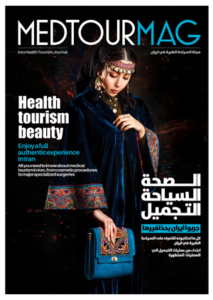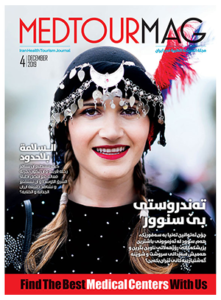Reza jamili
Different sections of this massive industry are once more on the rise
There are few industries in the world, components of which would be affected by a global pandemic as much medical tourism. Flashback to 2019 and medical tourism was at its all time high apex with its leading countries looking to ever expand their goals in the industry. Not only the experts, but no one expected a global pandemic of this scale to hit the world in 21st century. Although Covid-19 has been devastating for the world, both the tourism and the medical spheres have experienced a different level of damage.
This is further reflected by the news: there are frequent points being made about the effects of Covid-19 on international travel, restrictions, quarantines, and of course the tremendous pressure that it has put on the medical systems worldwide. Still, there are doubts among the experts, whether or not Covid-19 will prove a negative force in the medical tourism industry in the long run. This is the subject of this article, to examine the latest situation in the medical tourism during the Covid-19 pandemic.
Damage Estimation
A large part of medical tourism revolves around elective treatments. These are treatments that if nor performed will not threaten the health and well-being of the patient. A prime example are cosmetic treatments. They are also one of the main marketing points of prominent medical tourism destinations. Studies also show that a large percentage of the treatments that are sought after by medical tourists are cosmetic in nature. Covid-19 has caused the medical systems of the world to focus entirely on controlling the pandemic and this along with travel restrictions has practically eliminated this brand of the medical tourism. Still, vital treatments still play a role in medical tourism in developed countries. This is reflected by the fact that 2020 was the first year that cosmetic procedures ceased to be the most wanted treatment by medical tourists. This accounts for more than 35 percent of the medical tourism market that no longer operates. It is estimated that by the end of 2021, that 13 percent of this will be recovered. In long term, things seem better, as the previous growth projection of medical tourism for the year 2030 has remained at 80 percent, a sign of recovery.
Covid-19: A Loss for Many, Gain for a Few
Although most countries have suffered in medical tourism during the Covid-19 pandemic, there were a few countries that successfully managed to capitalize on the situation and turn it into an opportunity. These are countries that are developed and are situated among lesser countries with the option to use their lead to attract patients for Covid-19 vaccination. This is more so witnessed in Asia and South America. Countries like Chile, Argentina, and Singapore are main examples of this as they successfully integrated Covid-19 vaccination as part of their medical tourism brand.
The Current Vacuum Heralds a Medical Tourism Boom Post Covid-19
One of the most popular projections regarding the future of medical tourism is that, due to the large amount of cancelled medical tourism trips and a demand that has been overwhelmingly refused response during the pandemic, medical tourism will experience a massive growth after the pandemic eases down. Leading countries of medical tourism like Turkey, Germany, and Brazil stand to further consolidate their power in the industry in the coming years.
Who will be the Winners After the Pandemic?
During the age of medical tourism during the Covid-19 pandemic, those medical centers that were already considered elite showcased excellent resilience in combating the situation. This is while many other leading hospitals failed to do so and even were forced to shut down in the private sector. This will cause the former group to even further monopolize medical tourism services and treatment. Main examples of the elite hospitals and medical centers are Cleveland Clinic, the Mayo Hospital, the Burmungrad International, Apollo hospitals in India and the Acibadem chain in Turkey.
Normalization is Coming
During the initial weeks of the pandemic when the panic was at its highest, many began to speculate the complete demise of the medical tourism industry. Now however it seems things have begun to settle down. Many developed countries with high vaccination rates have already began to lift travel restrictions. The control phase in many countries is in its final days. Many countries also have a surplus of vaccines that can be both donated and used for medical tourism purposes. Due to the nature of the industry, and signs in the market the return of medical tourism to its former height and beyond seems inevitable







